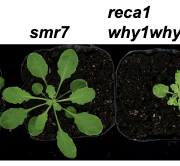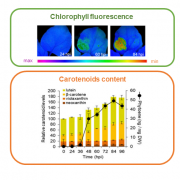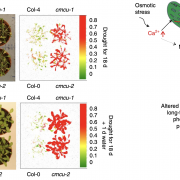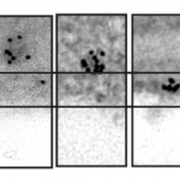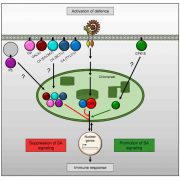Altering chloroplast biogenesis leads to increased yields in rice
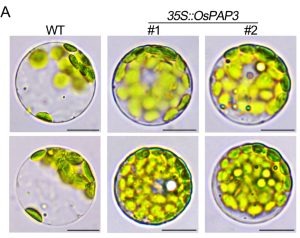 Transcription of chloroplast genes is carried out by the plastid encoded polymerase (PEP) with help from PAPs (PEP-associated proteins). PAP3 is important for chloroplast development in Arabidopsis thaliana and Nicotiana benthamiana, however its role in crops has not been fully elucidated. Here Seo et al. transformed rice to express OsPAP3 under the constitutively active 35S promoter. These plants had a 40-fold increase in PAP3 expression and were greener due to a significant increase in chlorophyll content. To assess the effect of PAP3 overexpression on chloroplast development, they quantified chloroplast number in one-week old protoplasts. For wild type plants there were approximately 14 chloroplasts per protoplast, whilst for the overexpression lines chloroplast number increased and there was an average of 21 chloroplasts per protoplast. To see if this caused an increase in plant productivity, the overexpression lines were grown in a paddy field for three consecutive years, and it was found that these plants had a 18-30% increase in yield. Hence altering chloroplast biogenesis could be an effective strategy to increase yields in crops. (Summary by Rose McNelly @Rose_McN) Plant Physiol. 10.1093/plphys/kiad536
Transcription of chloroplast genes is carried out by the plastid encoded polymerase (PEP) with help from PAPs (PEP-associated proteins). PAP3 is important for chloroplast development in Arabidopsis thaliana and Nicotiana benthamiana, however its role in crops has not been fully elucidated. Here Seo et al. transformed rice to express OsPAP3 under the constitutively active 35S promoter. These plants had a 40-fold increase in PAP3 expression and were greener due to a significant increase in chlorophyll content. To assess the effect of PAP3 overexpression on chloroplast development, they quantified chloroplast number in one-week old protoplasts. For wild type plants there were approximately 14 chloroplasts per protoplast, whilst for the overexpression lines chloroplast number increased and there was an average of 21 chloroplasts per protoplast. To see if this caused an increase in plant productivity, the overexpression lines were grown in a paddy field for three consecutive years, and it was found that these plants had a 18-30% increase in yield. Hence altering chloroplast biogenesis could be an effective strategy to increase yields in crops. (Summary by Rose McNelly @Rose_McN) Plant Physiol. 10.1093/plphys/kiad536



